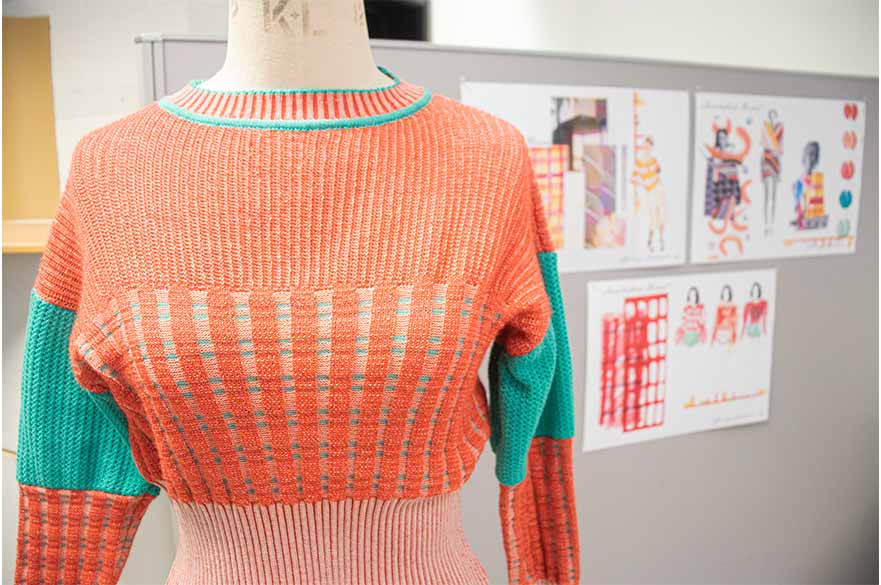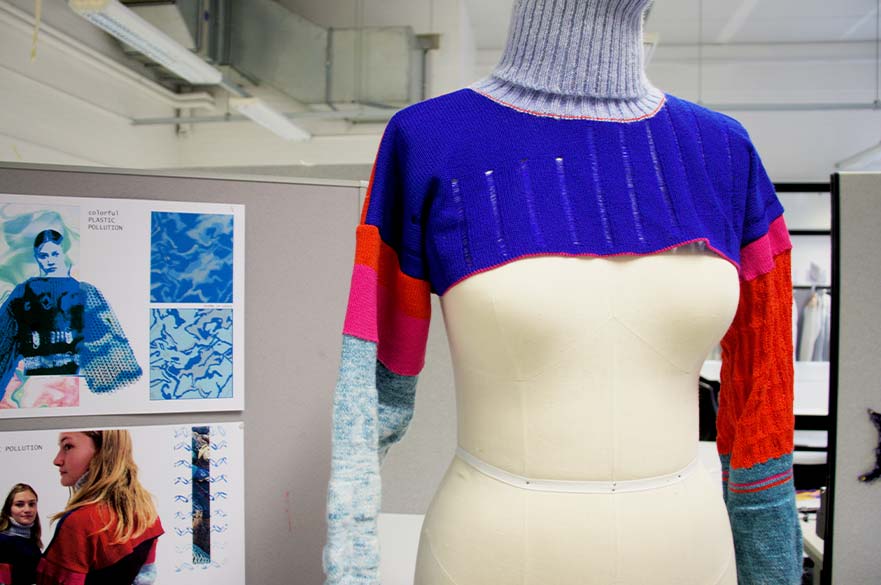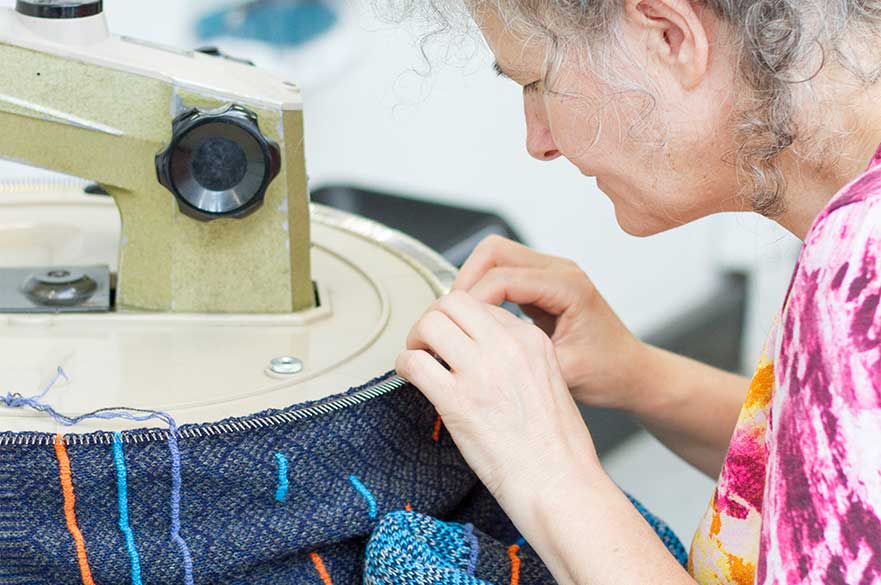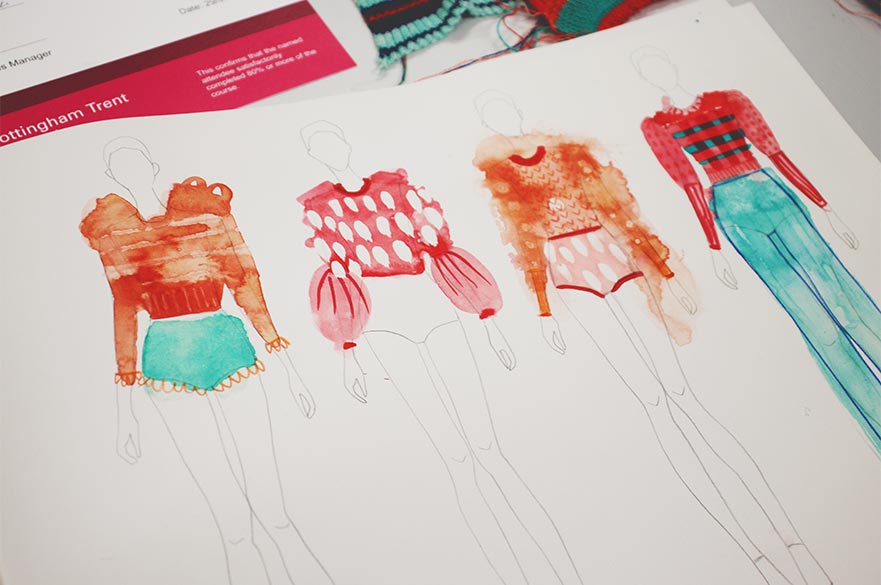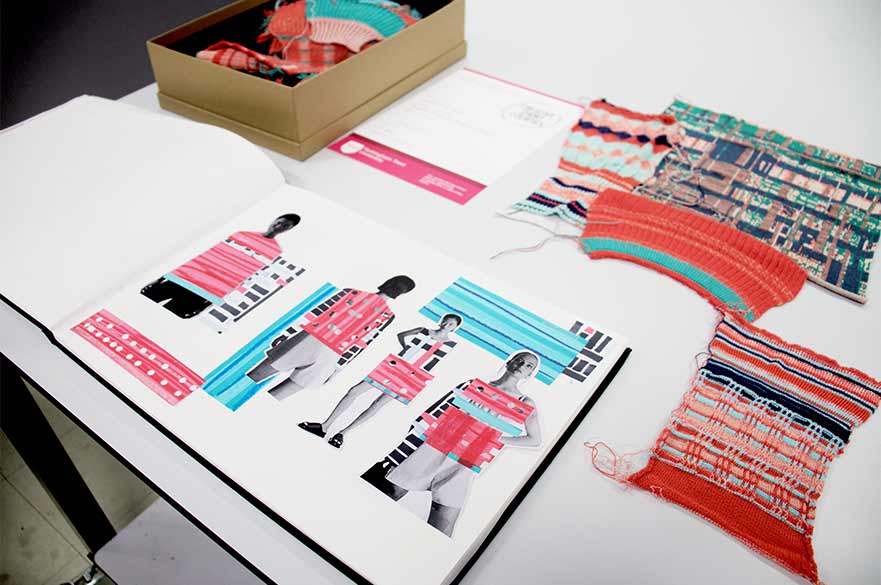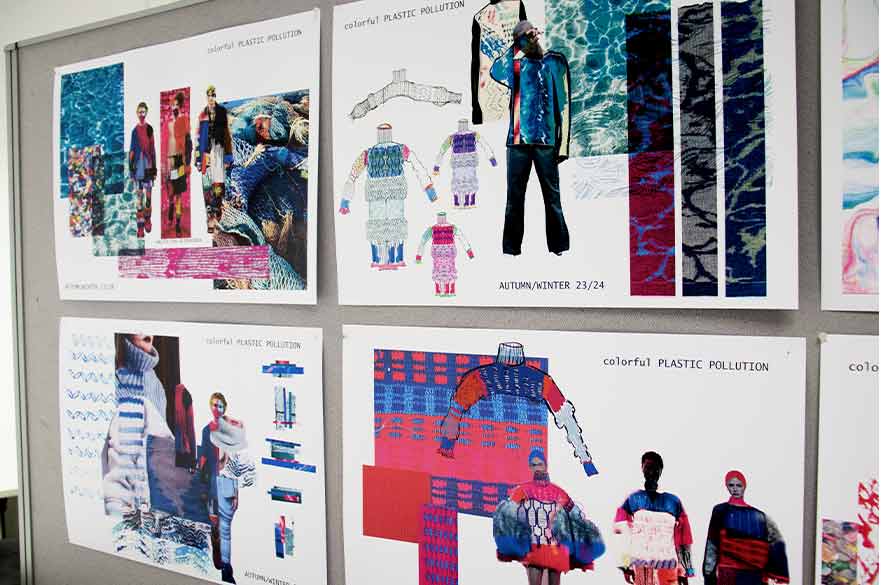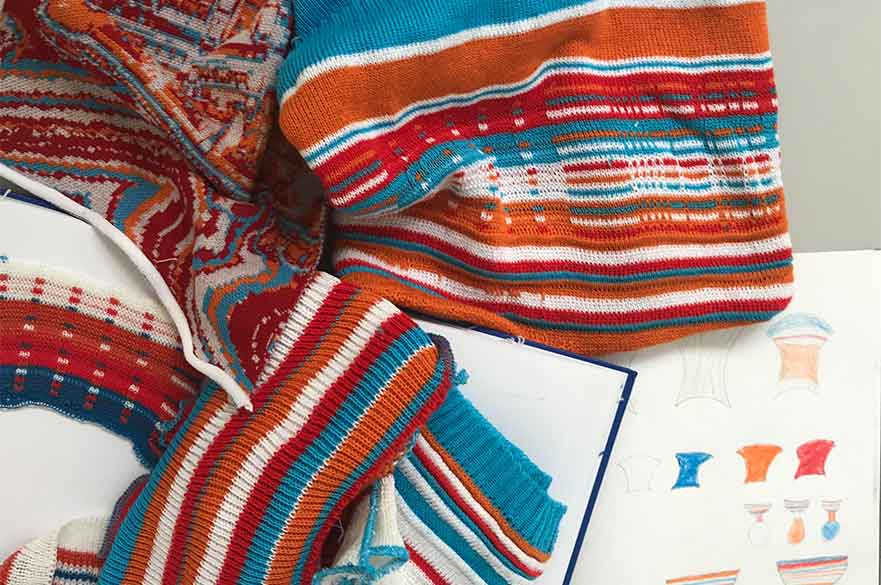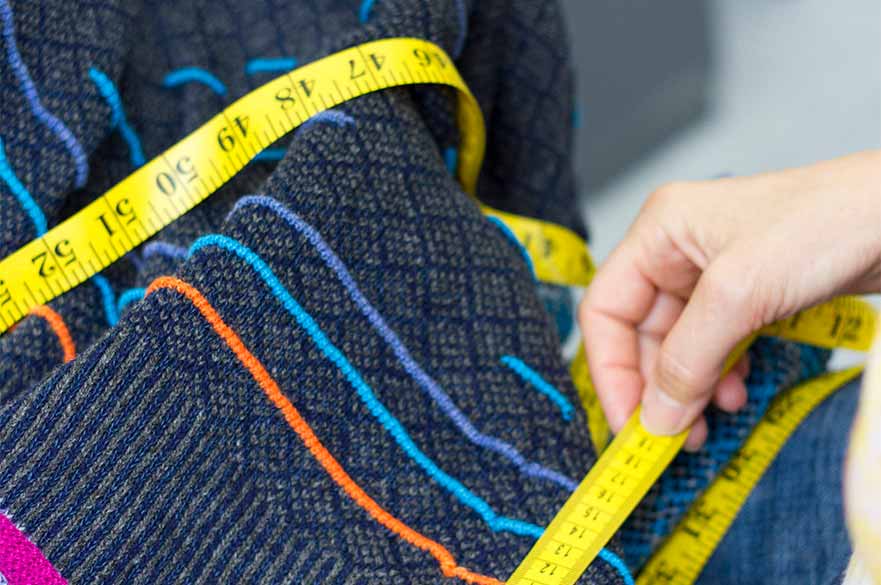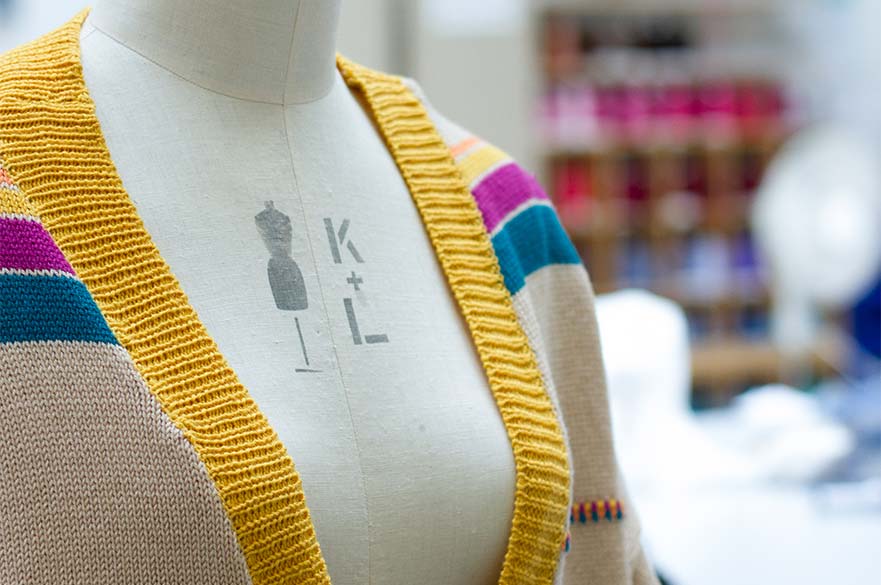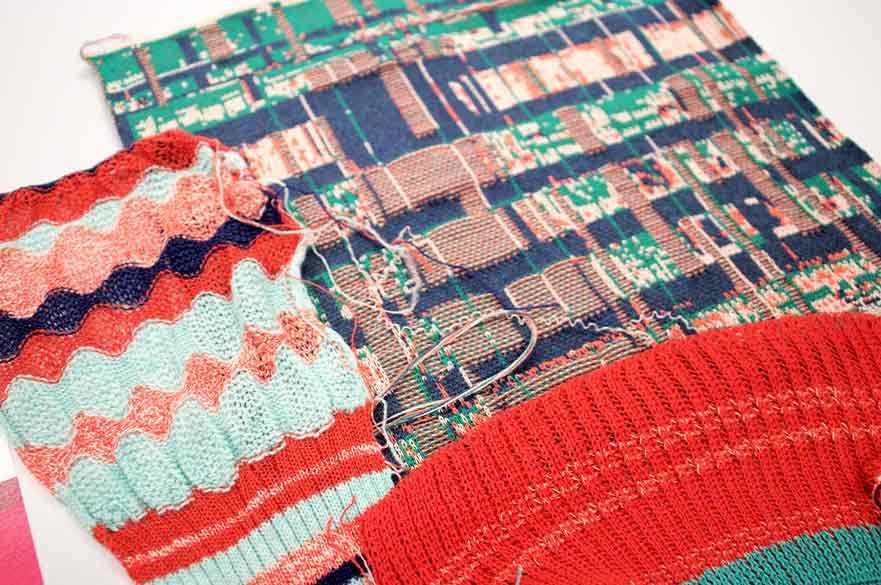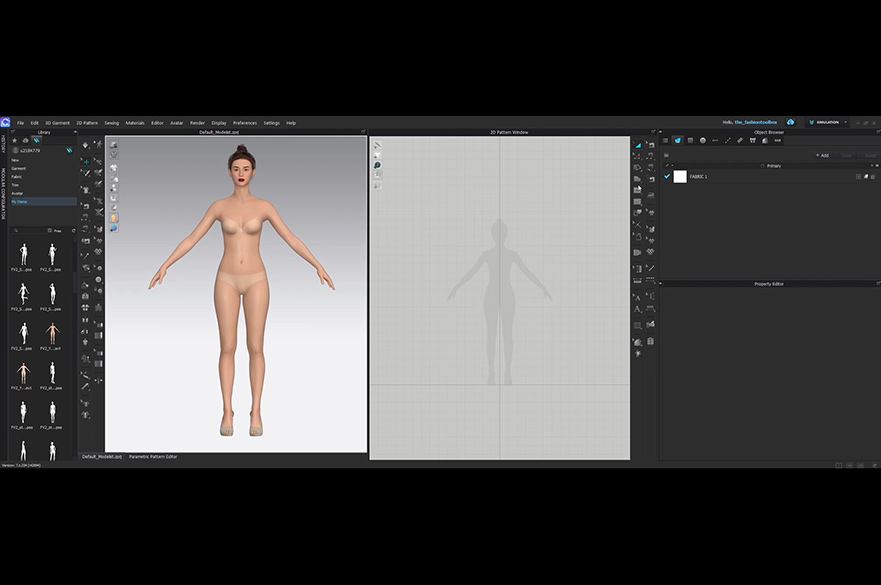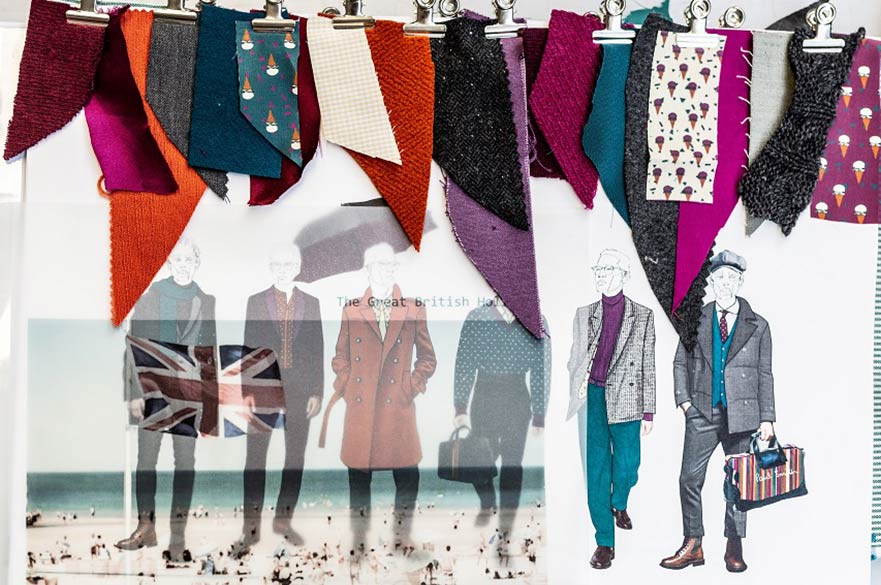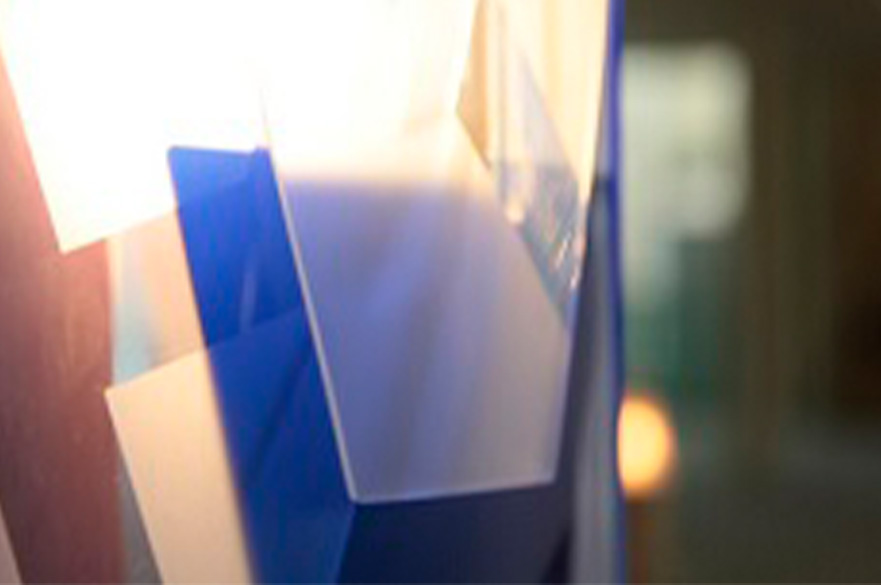Fashion Knitwear Summer School
- Level(s) of Study: Short course
- Course Fee:
£1,795
- Start Date(s): Future dates to be confirmed
- Duration: Monday to Friday 10 am - 4 pm, three weeks
- Study Mode(s): Part-time
- Campus: City Campus
- Entry Requirements: More information
Introduction:
Course dates:
Future dates to be confirmed, email us to join our waitlist.
This practical course combines the two interconnected disciplines of fashion and textiles through the medium of knitted fabric design.
It will start with design and trend research, followed by technical workshops on the industrial knitting machines to create knit samples, and will finish with garment construction.
By the end of three weeks, you’ll have a portfolio of work and a finished, accomplished and wearable piece of knitted fashion.
-
Nottingham Trent University has one of the most famous fashion and knitwear departments of all UK universities, with a team of expert tutors and specialist technicians that work with students and industry on innovative and creative projects.
-
You'll experience industry-level resources, explore design processes, extend your portfolio and create some amazing new work.
-
And all this takes place in the centre of Nottingham, a city that’s famous for its textile and fashion heritage.
-
This course is ideal for a range of people, especially students who have completed at least one year of an undergraduate course in fashion or textiles, fashion or textile professionals looking for inspiration, teachers and technicians looking for ways to engage with knit design and technology.
Here's what our previous attendees have said:
"The fashion knitwear summer school has quite simply changed my life. The course gave me so much confidence and provided everything I needed to design and make a garment from start to finish. Jane and the staff at NTU were so welcoming, their skills and expertise made everything look so easy and they were always on hand for questions and guidance" - Louisa Crompton, 2022
"As a total beginner the course gave me the chance to learn so much about the knitwear industry. It was the exact course I needed to help me make a decision about studying knitwear design back home in Belgium" - Billie Vermandere, 2022
"Whether you are a beginner like me who has never learned knitting before, or a professional who already has extensive knitting experience, you can learn the knowledge and skills that is suitable for you here. Jane will give you hands-on instruction and help, depending on your needs. Through this course, I have gained not only a complete knitted garment, some nice swatches, a portfolio, a happy memory and a unforgettable experience, but also a further understanding of knitting and related techniques, as well as very practical design skills, which will be a great help to my study in my last year at Donghua University, in China. I'm so glad I made the choice to sign up! I'm sure you won't regret coming to experience this summer course." - Yiyue Liu (Liv), 2024
What you’ll study
During the course, you’ll learn about and experiment with:
- knitted fabric design - specialising in the industrial Dubied machine
- fashion knitwear trend research
- yarn and material awareness
- knitted garment construction techniques
- the toiling process
- digital knit workshops.
You’ll also see the future of smart knitted textile technology.
The projects will enhance your knowledge of garment specification and terminology, enabling you to understand the potential in taking a piece from concept to manufacture.
By the end of the course you’ll have:
- the expertise to produce samples and swatches on the Dubied knitting machine that you can develop in the future
- the creative and technical ability to design, knit and construct a basic yet accomplished garment
- innovative, contemporary work for your portfolio
- a new network of knit practitioners.
Aims and Objectives of week 1
To deepen your knowledge, build your skills base and develop your initial fabrics on hand flat knitting machines.
First CAD session, focusing on methods of information gathering relating to research and context, and the documentation of technical processes. Sketchbook and design development begins.
Design tutorials held during the week, providing you with informal critical feedback. Introduction to pattern cutting and garment make up.
Day 1
- Introduction to course and opportunity to meet staff and fellow attendees
- University resources tour
- Presentation and discussion of set brief
- Opportunity to view sketchbooks and portfolios of recent Knitwear graduate leavers from NTU
- Self-directed study and sketchbook development
Day 2
Hand flat machine knitting
Intensive day of demonstration, instruction and guided exploration of the machine knit process using domestic machines, covering basic techniques.
Day 3
Gathering, organising and presenting research information
CAD Information gathering
CAD Development of mood board.
Day 4
Hand flat machine knitting
Intensive day of demonstration, instruction and guided exploration of the machine knit process using domestic machines, covering basic techniques.
Day 5
Pattern cutting and garment make up
Intensive day of demonstration and guided exploration covering the basic methods of garment construction. Development of personal garment block.
Aims and Objectives of week 2
To build your skill base, and continue to develop knitted fabric swatches, selecting appropriate techniques which identify links between contextual research and own sketchbook development. Through CAD, develop garment flats and illustrative skills directly linked to knitwear and knitted fabrics. Factory visit. Design tutorials will be held during the week, providing you with informal critical feedback.
Day 1
Power knit
An insight into computer aided knitted fabrics. Lecture, demonstration and development of own fabric design.
Day 2
Hand flat machine knitting
Knitting trials and experiments of individual design ideas Invite to attend Master’s Degree Fashion and Textiles Private View.
Day 3
CAD for design communication Garment ‘flats’.
Developing the skills to communicate your final outcome (i.e. garment flats and specification sheets).
Day 4
Hand flat machine knitting
Knitting trials and experiments of individual design ideas
Day 5
- Factory visits (morning) Studio (afternoon) Visit to John Smedley head office.
- Personal research and development.
- Knitting up of final garment.
Aims and objectives of week 3.
- To use the structures developed from your knitted swatches (from weeks 1 and 2), knit and construct your final designed garment.
- Complete your portfolio sheets, outlining illustrations of final garment using CAD.
- Finalise your technical files, using specific technical terminology.
- Two design tutorials will take place, providing you with informal critical feedback.
Day 1
Fabric manufacture Knitting of final garment.
Day 2
Garment assembly Garment development. Garment construction.
Day 3
CAD for portfolio design CAD. Developing a series of portfolio sheets. CAD. Developing a series of portfolio sheets.
Day 4
Garment assembly Garment development. Garment construction. End of course social event.
Day 5
Project presentation Completion of project. Presentation and farewell celebration.
Fashion Knitwear Summer School in action
Student Work
How you’re taught
Learning will take place during scheduled workshops including technical knit and garment make up sessions, sketchbook and research investigation, and portfolio development.
You’ll be encouraged to use the University's extensive library resources and visit galleries or museums to help generate your own personal concepts.
Supporting your studio work, and to help put your skills and knowledge into a historical and global context, there’ll be a visit to a famous knitwear manufacturer (subject to availability) during the course.
Contact hours
You will receive 75 contact hours of quality tuition with an experienced tutor.
Careers and employability
On successful completion of the course you will receive a certificate of attendance, which will further enhance your CV.
Campus and facilities
You will be based in the Bonington building at the City Campus, our dedicated art and design hub.
You will have access to an excellent range of facilities and equipment in the knitwear studio, with knitwear hand flat workshops and dubied / domestic machines, and industrial flatbed hand knitting machines.
There are also knitwear make-up workshops, with circular machines, linkers, overlockers, lockstitch machines, and button hole machines and fully-fashioned Shima and Stoll v-bed digital machines.
You’ll also have access to our library to use outside of your short course; whilst you can’t reserve or take away books, you are welcome to use them as a resource for research and referencing.
Entry requirements
Level: Open to all.
Entry requirement: You should have a background or interest in fashion or textile design. Knit experience is not required.
You must be over the age of 18 in order to attend this course.
Fees and funding
The fee for this course is £1,795.
Payment is due at the time of booking - ask us if you'd prefer an invoice sent to your company.
Secure your place with a deposit - If you're booking more than two months before the course starts, we can accept a £200 deposit to secure your place, and the balance is due one month before the course starts.
Your course fees cover the cost of studies, including most materials to create your designs and other great benefits such as the use of our modern library and free use of the IT equipment and software on the campus during your course.
Please bring with you to the first session:
- your everyday art box contents including pens, pencils, paints etc.
- choose a sketchbook that suits your style of working – A4/A3 allows you to have some freedom yet isn’t so large that it becomes intimidating to use
- a project brief and further details will be sent to you separately, prior to the course starting.
You can read the terms and conditions of booking here.
Need accommodation for a week long summer course?
Accommodation can be booked separately to the course; the rooms are only a few minutes’ walk from our studios and classrooms, and cost £259 per week.
These are single rooms with a private bathroom in shared apartments in Nottingham Trent University’s city campus accommodation, which is ideal if you're looking to be based in Nottingham's lively city centre and want an economical place to stay.
Find out more and book your accommodation here.
How to apply
You can book your place via the NTU online store:
Future dates to be confirmed, email us to join our waitlist.
Browse all our fashion, textiles and costume short courses
Any questions?
Contact the short course team:
Email: creativeshortcourses@ntu.ac.uk
Tel: +44 (0)115 848 2813
